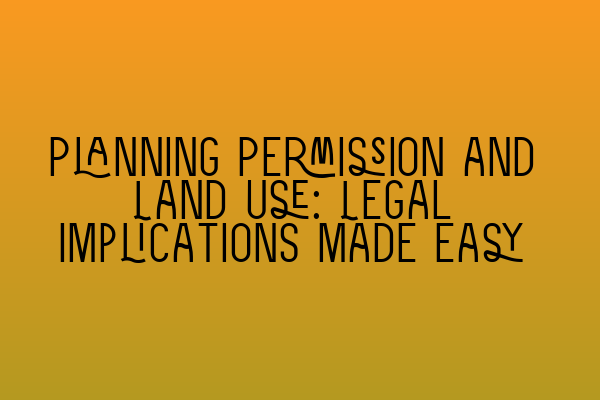Planning Permission and Land Use: Legal Implications Made Easy
When it comes to property development and land use, understanding planning permission is crucial. Whether you are a property investor, developer, or homeowner looking to make changes to your property, knowing the legal implications of planning permission is essential to ensure compliance with local regulations. In this article, we will provide an overview of planning permission, its importance, and the legal considerations you need to keep in mind.
What is Planning Permission?
Planning permission is the legal authorization required from local government authorities to carry out certain types of development or change the use of land or buildings. It ensures that any proposed development is in line with local planning policies and regulations and takes into account factors such as environmental impact, infrastructure, and neighboring properties.
In the United Kingdom, planning permission is primarily governed by the Town and Country Planning Act 1990 and is regulated by local planning authorities. These authorities carefully assess planning applications to determine whether they comply with local policies and make decisions accordingly.
Why is Planning Permission Important?
Planning permission is crucial for a number of reasons:
- Compliance: Carrying out development without the necessary planning permission is illegal and can lead to enforcement action by the local planning authority, including the requirement to reverse the changes made.
- Safeguarding Neighbors: Planning permission ensures that any proposed development takes into account the impact on neighboring properties, considering factors such as privacy, noise, and access.
- Environmental Considerations: Planning permission enables local authorities to assess the environmental impact of a development and ensure that proper measures are taken to minimize any adverse effects.
- Infrastructure Planning: Planning permission allows local authorities to manage the development of an area in a controlled manner, ensuring that necessary infrastructure is in place to support the proposed development.
Understanding the Planning Permission Process
The planning permission process typically involves several stages:
- Pre-Application: Before submitting a planning application, it’s advisable to engage with the local planning authority to discuss your proposed development. This allows you to gain feedback and understand any potential issues that may need to be addressed.
- Application Submission: Once you have prepared the necessary documentation, including plans and supporting information, you can submit the planning application to the local planning authority. The application will be assessed based on local policies, environmental considerations, and input from relevant stakeholders such as neighbors and utility providers.
- Decision: After reviewing the application, the local planning authority will make a decision. This can result in approval, refusal, or approval with conditions.
- Appeals: If your application is refused, you have the right to appeal the decision to a higher authority, such as the Planning Inspectorate.
- Implementation: If your application is approved, you can proceed with the development, ensuring that you comply with any conditions imposed by the local planning authority.
Legal Considerations and Potential Challenges
While obtaining planning permission is key, it’s important to consider some legal implications and potential challenges that may arise:
- Restrictive Covenants: Restrictive covenants are legal agreements that can restrict the use or development of a property. It’s crucial to review any existing covenants on your land or property to determine if they may affect your proposed development.
- Planning Conditions: Planning permission often comes with conditions that need to be fulfilled before, during, or after the development. These conditions could vary from the type of materials used to the hours of operation. Failure to comply with planning conditions can result in enforcement action.
- Amendment of Planning Permission: If you need to make changes to an approved planning permission, you may be required to submit an application for its amendment. It’s essential to seek legal advice to ensure compliance with the necessary procedures.
- Enforcement Action: If you carry out development without obtaining planning permission, you may be subject to enforcement action by the local planning authority, which can include fines, court proceedings, or even the requirement to reverse the changes made.
Conclusion
Understanding planning permission and its legal implications is crucial when it comes to property development and land use. Failure to comply with planning regulations can have serious consequences, including financial penalties and the requirement to reverse changes made. Therefore, it’s essential to engage with an experienced property law solicitor who can guide you through the planning permission process, ensuring that all legal requirements are met.
If you have any questions regarding planning permission or require legal advice, please feel free to reach out to SQE Property Law & Land Law. Our team of experts is here to assist you.
Related Articles:
